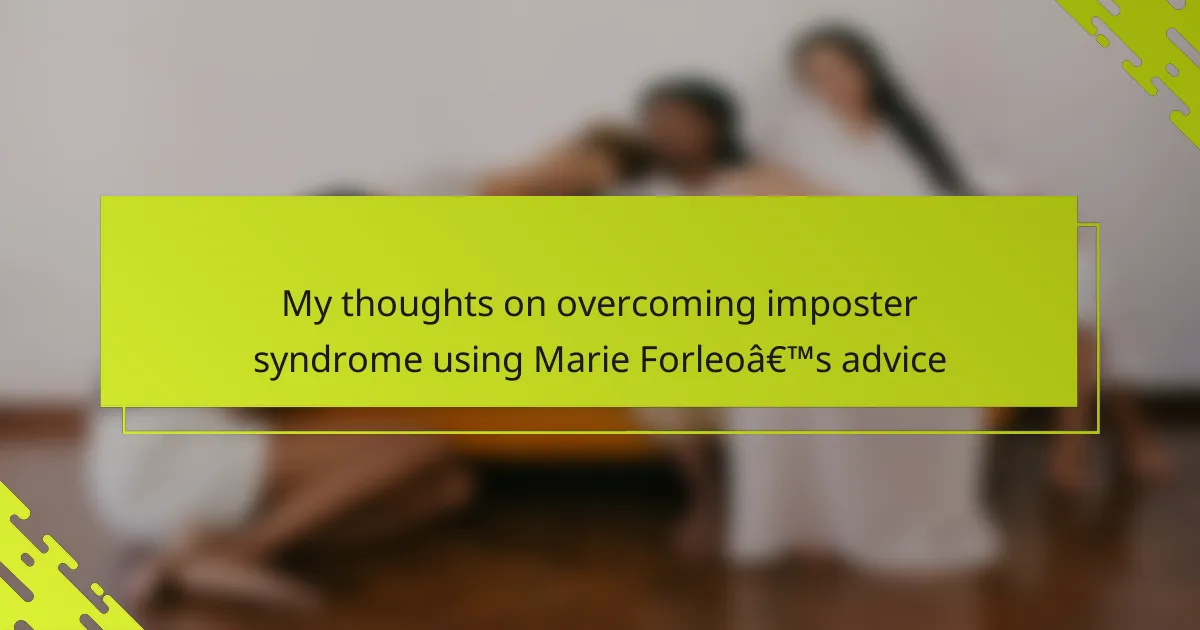Key takeaways
- Imposter syndrome is a common experience affecting individuals across various backgrounds, involving persistent fears of inadequacy despite evident success.
- For queer women, societal pressures and the need to prove oneself can intensify feelings of self-doubt, making recognition and solidarity within the community essential.
- Marie Forleo’s advice emphasizes challenging self-critical narratives, taking small actionable steps, and viewing doubts as signals for growth rather than failures.
- Building confidence in queer women’s culture thrives on shared experiences and community support, fostering a collective strength against external judgments.
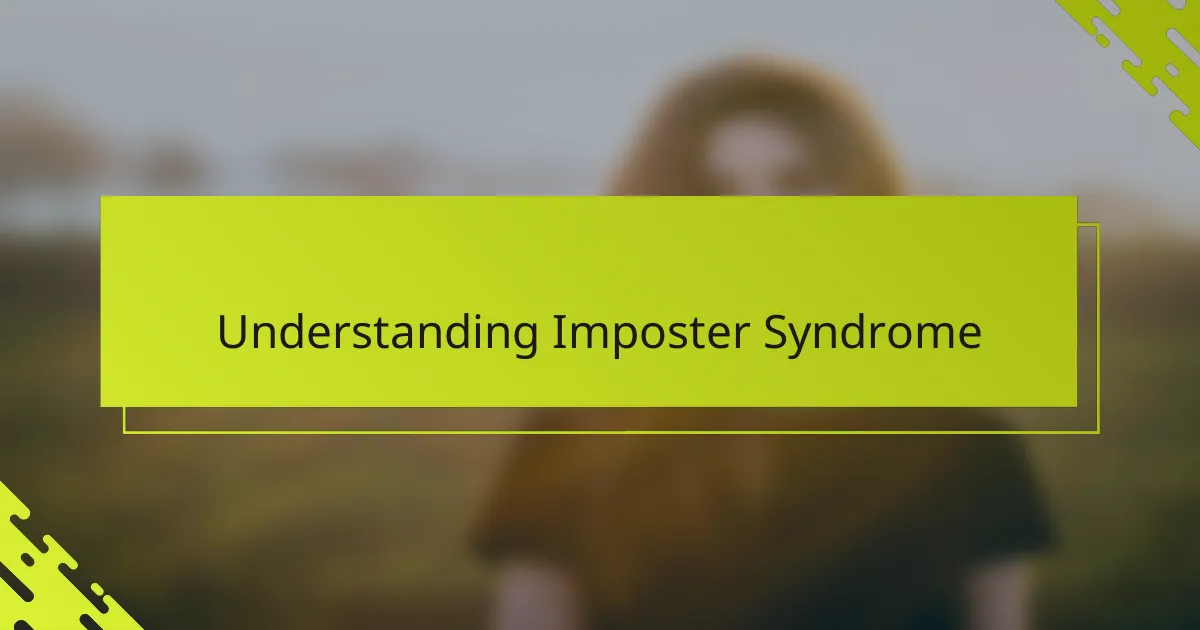
Understanding Imposter Syndrome
Imposter syndrome often feels like a quiet, nagging voice in the back of my mind, telling me I don’t belong or that I’m just “faking it.” It’s more than just occasional self-doubt; it’s a persistent fear of being exposed as a fraud, even when success is clear. Have you ever caught yourself discounting your achievements, thinking they’re just luck or timing?
For me, this feeling can be overwhelmingly isolating, like I’m the only one struggling to feel worthy in spaces where I’m visibly different, especially as a queer woman. Understanding imposter syndrome means recognizing it as a common experience rather than a personal flaw. When I started naming these thoughts, I realized they weren’t facts—they were feelings that could be challenged.
What’s fascinating is that imposter syndrome doesn’t discriminate; it shows up for people across all backgrounds and achievements. Yet, in queer communities, where acceptance is often hard-won, this doubt can hit even harder. Acknowledging this is the first step in taking back control and reshaping how we see ourselves.
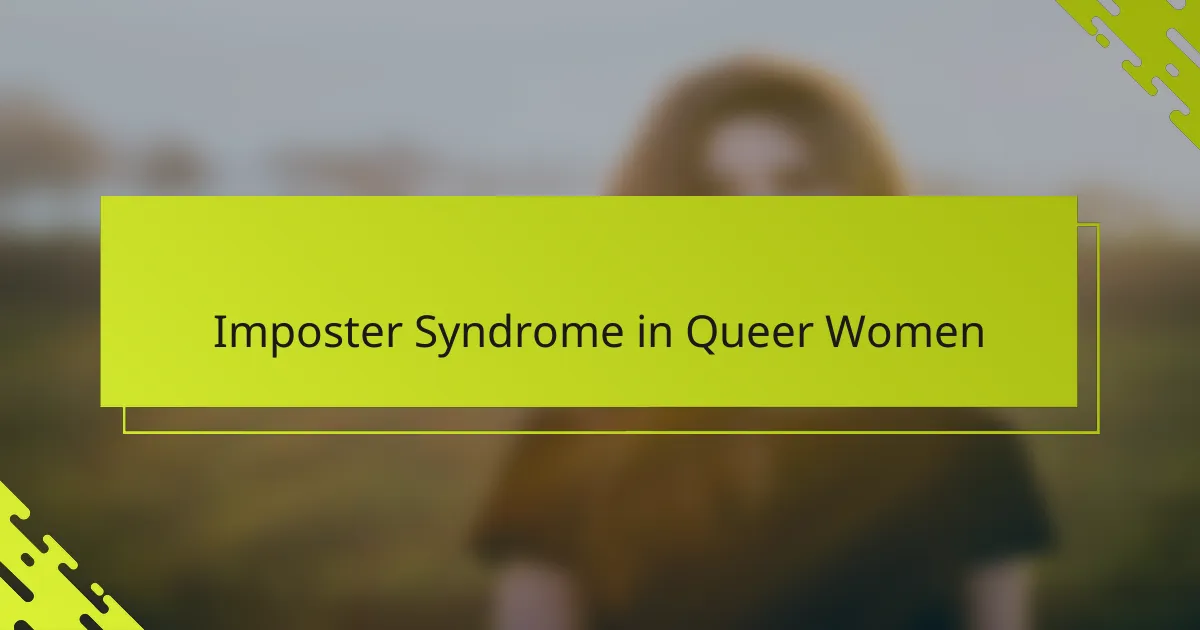
Imposter Syndrome in Queer Women
For many queer women, imposter syndrome isn’t just about doubting abilities—it’s tangled up with the deep-rooted experience of feeling unseen or misunderstood by society. I remember times when being one of the few queer voices in a professional room made me question if I deserved my seat at the table, even though I had worked hard for it. Have you ever felt like your identity somehow undermined your confidence, adding an extra layer to that internal dialogue of “Who am I to be here?”
This feeling often stems from the intersection of societal pressures and the constant need to prove oneself in environments that don’t always celebrate queer identities. From my perspective, it’s not just about personal inadequacy but about navigating spaces that weren’t designed to include us fully. That ongoing tension can make self-doubt feel more intense and persistent.
What struck me most was realizing that this version of imposter syndrome is a shared experience among many queer women, even if it doesn’t always get named. Doesn’t it make sense that when you carry the weight of external judgment, your internal critic gets louder? Recognizing this collective experience helped me shift from feeling isolated toward building solidarity and strength within our community.
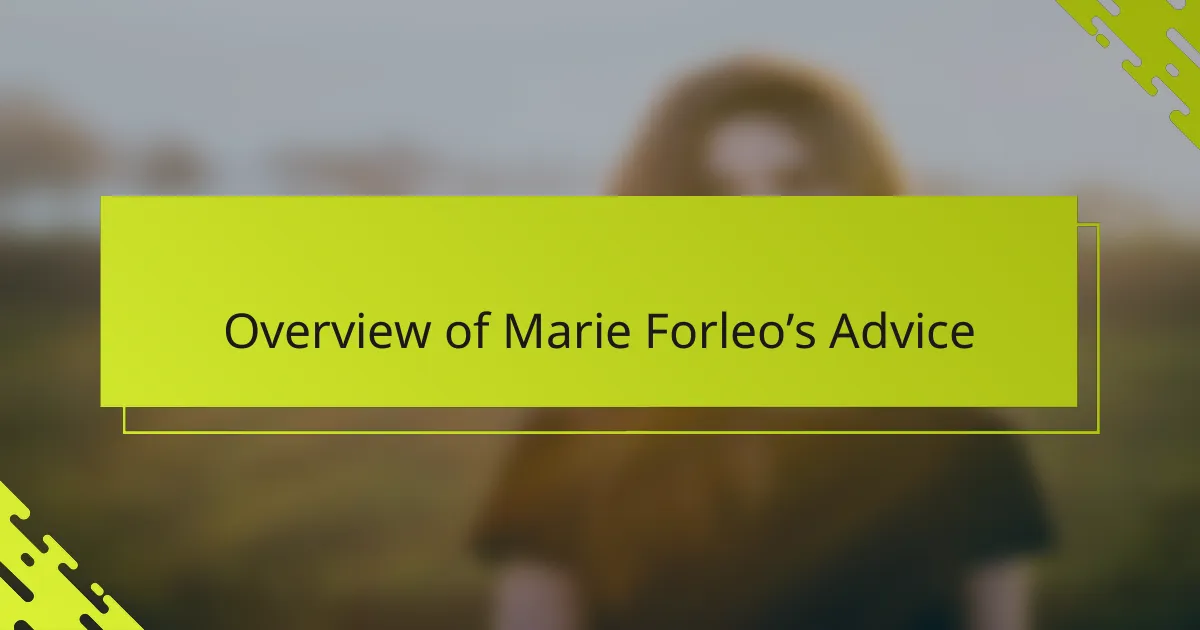
Overview of Marie Forleo’s Advice
Marie Forleo’s advice on overcoming imposter syndrome has been a game-changer for me, especially when she emphasizes the power of rewriting the stories we tell ourselves. Have you ever paused to ask who’s really behind that voice telling you, “You don’t belong”? Forleo encourages us to challenge those narratives instead of accepting them as truth—something I found both freeing and necessary.
She also focuses on the importance of taking action, no matter how small, to build confidence. I remember feeling stuck in my own self-doubt until I tried this approach: starting with tiny steps that felt manageable. It wasn’t an instant fix, but each small win chipped away at the fear of being a fraud. Isn’t it comforting to realize that progress doesn’t have to be perfect or immediate?
What I appreciate most is Forleo’s reminder that imposter syndrome is not a reflection of our actual abilities but a sign that we’re stepping outside our comfort zones. This perspective shifted how I see moments of doubt—as signals of growth rather than failure. Have you noticed that embracing discomfort often leads to the most meaningful breakthroughs? That mindset shift made all the difference for me.
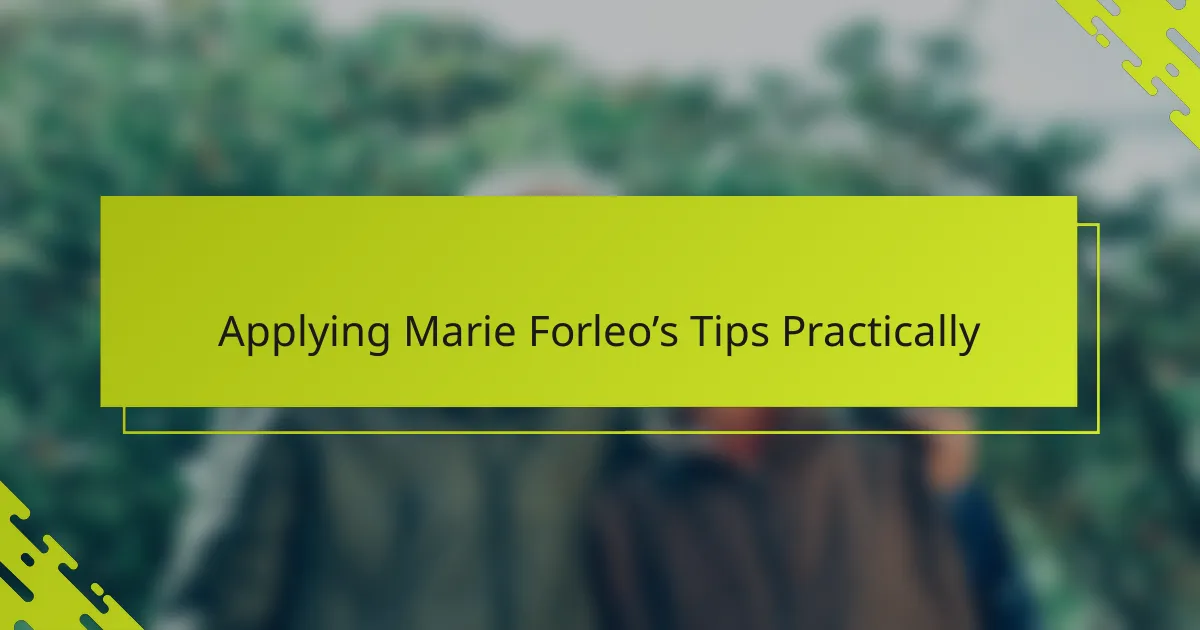
Applying Marie Forleo’s Tips Practically
Putting Marie Forleo’s advice into practice meant I had to become more intentional about catching those self-critical thoughts in the moment. Have you ever tried pausing and asking yourself, “Is this really true?”? I found that simple question became a powerful tool to interrupt my automatic impulse to doubt myself. It felt like training my mind to take a step back rather than spiral.
I started breaking down my goals into tiny steps, even if they felt almost laughably small at first. For example, sending just one email or sharing one idea in a meeting became a way to prove to myself that I belong. Over time, those small wins added up and softened the grip of imposter syndrome, which felt incredibly validating and motivating.
Marie’s emphasis on rewriting my internal narrative pushed me to journal regularly—something I hadn’t been consistent with before. By writing down my achievements and challenging the “fraud” narrative, I began to see a pattern: those negative voices were just stories, not facts. Have you ever noticed how putting something on paper makes it easier to unpack and change? That practice became a lifeline.
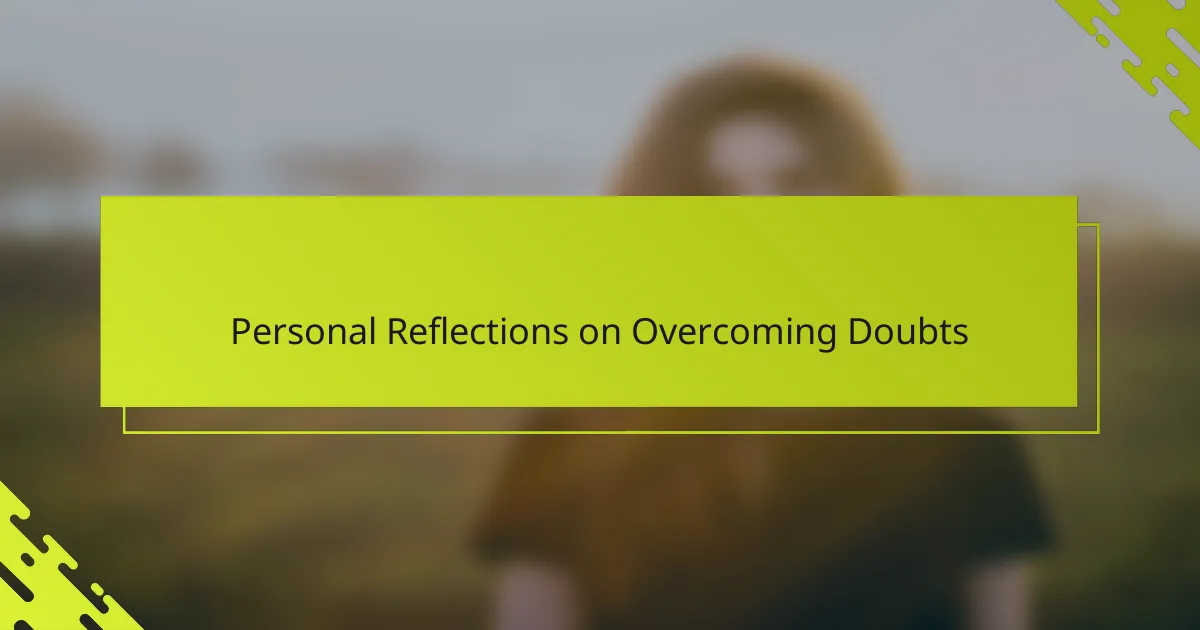
Personal Reflections on Overcoming Doubts
At times, the doubts felt like shadows that stretched longer than the daylight of my achievements. I remember sitting alone, questioning if my success was real or just luck playing a cruel trick. Have you ever found yourself stuck in that endless loop of second-guessing, wondering if you’ll ever truly own your accomplishments?
What ultimately helped me was learning to listen differently to those doubts—not as enemies but as signals asking for attention. For example, when I felt that familiar pinch of “maybe I don’t belong,” I tried reflecting on the small wins I’d accumulated instead of brushing them aside. Did I believe those wins immediately? No, but gradually, each reflection softened the grip of self-doubt.
Sometimes, I catch myself wondering why it’s so hard to silence the inner critic, especially when the outside world seems to affirm my worth. But I’ve noticed that acknowledging the doubt without shame creates space for growth. Isn’t it empowering to think that the very doubts we fear could be gateways to deeper self-understanding? This perspective changed how I approach those moments, turning them from stumbling blocks into stepping stones.
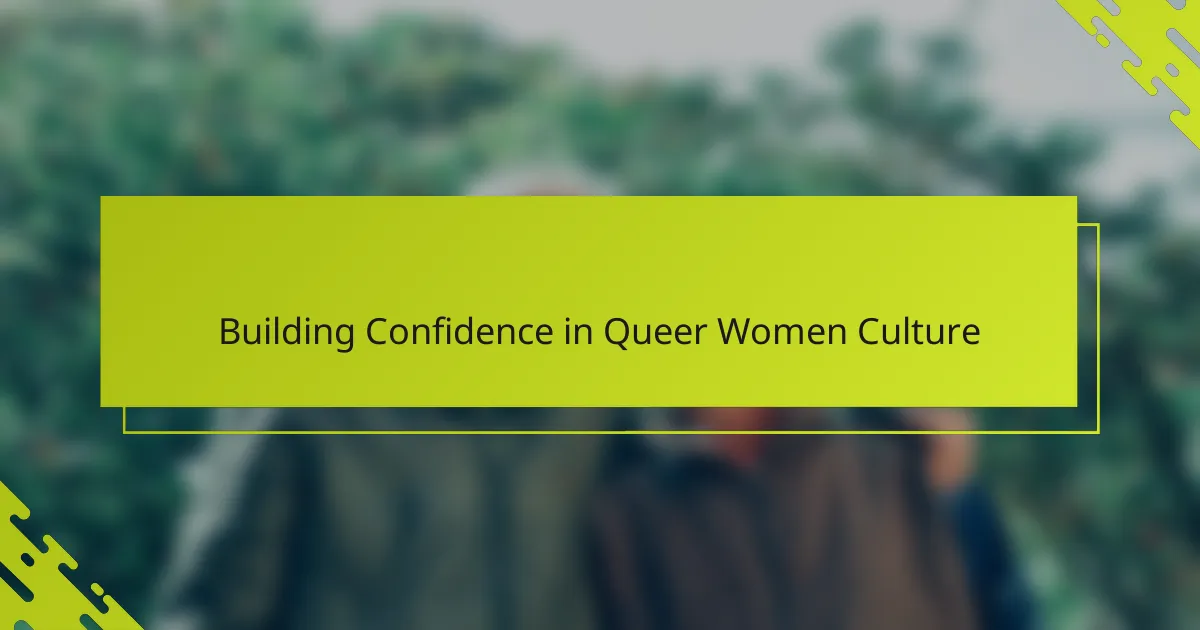
Building Confidence in Queer Women Culture
Building confidence in queer women culture feels like nurturing a garden in a landscape that hasn’t always been welcoming. I’ve found that embracing our unique stories and struggles creates a powerful sense of belonging that fuels self-assurance. Have you noticed how sharing even small victories within our community can spark a ripple effect of confidence?
Sometimes, it’s about reclaiming space that society hasn’t handed to us freely. I remember the first time I voiced my ideas in a queer-friendly setting—it was a mixture of excitement and vulnerability, but each time I spoke up, my confidence grew just a little more. Isn’t it amazing how those moments, though simple, build a foundation for lasting self-belief?
What strikes me most is how confidence in queer women culture isn’t just personal; it’s collective. When we uplift each other, we create a shared strength that challenges the messages telling us we don’t belong. How different would our self-perceptions be if we saw our community as the source of our courage rather than a backdrop for doubt?
